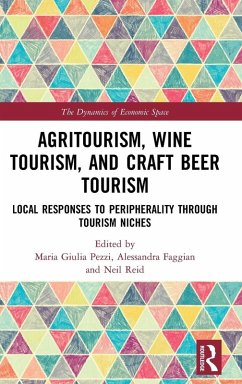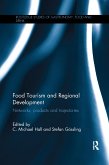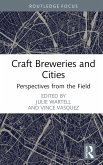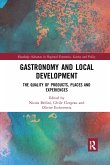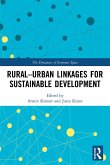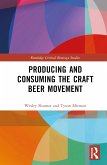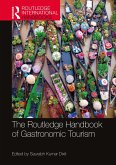This book delves into the development opportunities for peripheral areas explored through the emerging practices of agritourism, wine tourism, and craft beer tourism. It celebrates the entrepreneurial spirit of people living in peri-urban regions.
Peripheral areas tend to be far from urban hubs, providing essential services but also typically suffering from marginalisation and remoteness, despite the access to environmental, cultural, and social resources. In this sense, this book investigates the linkages between local agency and tourism in peripheral areas, the role of existing policies, and the evolving bottom-up practices in fostering local development. The basic aim is to disestablish the dichotomies that often emerge when dealing with issues of rural-urban and/or centre-periphery relationships; innovation vs tradition; authenticity vs mise en scène; agency vs inertia; and social, cultural, economic mobility vs immobility; etc. With focused attention on the possible compliance or conflicting strategies of local actors with the existing policies, the book considers how local actors and communities respond to the implications of peripherality in areas often impacted by marginalising processes.
Drawing upon case studies from North America and Europe, this book presents this connection as a global phenomenon which will be of interest to community and economic development planners and entrepreneurs.
Peripheral areas tend to be far from urban hubs, providing essential services but also typically suffering from marginalisation and remoteness, despite the access to environmental, cultural, and social resources. In this sense, this book investigates the linkages between local agency and tourism in peripheral areas, the role of existing policies, and the evolving bottom-up practices in fostering local development. The basic aim is to disestablish the dichotomies that often emerge when dealing with issues of rural-urban and/or centre-periphery relationships; innovation vs tradition; authenticity vs mise en scène; agency vs inertia; and social, cultural, economic mobility vs immobility; etc. With focused attention on the possible compliance or conflicting strategies of local actors with the existing policies, the book considers how local actors and communities respond to the implications of peripherality in areas often impacted by marginalising processes.
Drawing upon case studies from North America and Europe, this book presents this connection as a global phenomenon which will be of interest to community and economic development planners and entrepreneurs.

